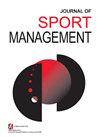后奥运遗产组织治理:比较研究
IF 3.5
2区 管理学
Q1 HOSPITALITY, LEISURE, SPORT & TOURISM
引用次数: 0
摘要
本研究考察了奥运后遗产组织的治理。通过对三届冬奥会(2002年盐湖城冬奥会、2010年温哥华冬奥会和2018年平昌冬奥会)的赛后遗产组织进行跨案例比较分析。借助治理框架,本研究调查了治理的政治(利益相关者关系)、政体(制度结构)和政策(政策内容和工具)维度,并探索了促进这些组织采取集体行动的治理模式。本研究的数据包括档案资料和对相关组织主要代表的半结构化访谈。确定了三种不同的奥运后遗产组织治理模式(公私、互动和自我治理),并提出了奥运后遗产组织治理的概念模型。这一发现具有理论和实践意义,有助于扩大我们对奥运遗产管理的理解。本文章由计算机程序翻译,如有差异,请以英文原文为准。
Governance of Post-Olympic Games Legacy Organizations: A Comparative Study
This study examines the governance of post-Olympic Games legacy organizations. A cross-case comparative analysis was completed by focusing on post-Games legacy organizations from three Winter Olympics (Salt Lake City 2002, Vancouver 2010, and PyeongChang 2018). Drawing on a governance framework, this research investigates the politics (stakeholder relationships), polity (institutional structures), and policy (the policy content and instruments) dimensions of governance, and explores modes of governance that facilitate collective action taken by these organizations. Data for this study included archival materials and semistructured interviews with key representatives from the relevant organizations. Three different post-Games legacy organization governance modes (public–private, interactive, and self-governance) were identified, and a conceptual model of the governance of post-Games legacy organizations is proposed. The findings have theoretical and practical implications that expand our understanding of the governance of Olympic legacy.
求助全文
通过发布文献求助,成功后即可免费获取论文全文。
去求助
来源期刊

Journal of Sport Management
社会科学-运动科学
CiteScore
5.80
自引率
19.40%
发文量
33
审稿时长
>12 weeks
期刊介绍:
The sport management industry is growing by leaps and bounds, with an explosion in research projects, texts, and university programs. As the field continues to rapidly evolve, it’s imperative for sport managers to keep abreast of the latest developments. The peer-reviewed Journal of Sport Management (JSM) is your key to staying on top of current issues and trends in this dynamic field. An official journal of the North American Society for Sport Management, JSM brings you thought-provoking editorials, research articles, and reviews that examine a number of areas as they relate to the management, governance, and consumption of sport, such as: organizational theory, behavior, and strategy; sport operations; marketing, consumer behavior, sponsorship, advertising, and licensing; media, communications, and public relations; sport tourism; facility and event management; and gender and diversity.
 求助内容:
求助内容: 应助结果提醒方式:
应助结果提醒方式:


